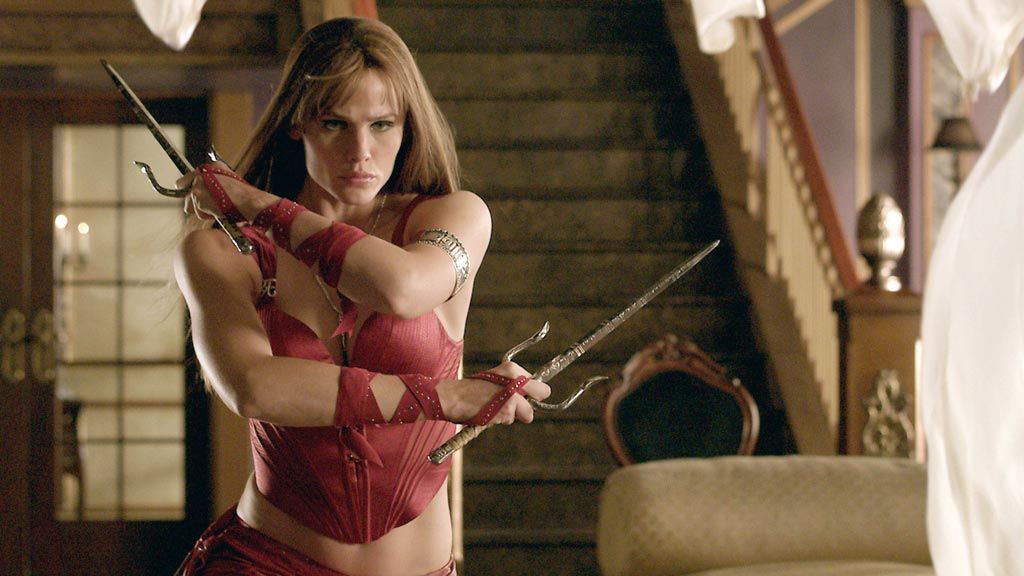In a bold move set to redefine Marvel Cinematic Universe’s (MCU) narrative landscape, Jennifer Garner’s Elektra Natchios is making a comeback, courtesy of the much-anticipated Deadpool & Wolverine slated for release in 2024. This announcement marks a pivotal moment not only for Garner’s career but also for Marvel Studios’ strategic direction in embracing its diverse catalogue of characters.
Elektra’s cinematic journey began auspiciously in 2003’s Daredevil, where Garner first embodied the role of Elektra Natchios, a deadly assassin entwined with the vigilante Daredevil, played by Ben Affleck. Garner’s portrayal resonated with audiences enough to prompt a standalone spin-off, Elektra, released in 2005. However, the promise of expanding her character’s universe faltered as the film met with harsh criticism and underwhelming box office returns, solidifying its place among Marvel’s least successful ventures to date.
Despite Elektra’s less-than-stellar debut, Garner’s return in Deadpool & Wolverine signals a unique opportunity for redemption within the MCU’s evolving multiverse narrative. Deadpool & Wolverine, tethered firmly to the concept of multiverse exploration, promises to weave together disparate timelines and realities, a hallmark of recent MCU successes like Spider-Man: No Way Home and Doctor Strange in the Multiverse of Madness.
The film’s premise hinges on the enigmatic Deadpool, portrayed by Ryan Reynolds, and the feral Wolverine, a role indelibly linked with Hugh Jackman’s iconic portrayal. Their narrative trajectory intersects with Elektra’s, offering a chance to reframe her character’s arc amidst the boundless possibilities of the multiverse. This narrative canvas not only allows for Elektra’s reintroduction but also sets the stage for her to transcend the limitations of her previous cinematic portrayal.
Garner’s return to Elektra after nearly two decades underscores Marvel Studios’ commitment to leveraging its extensive character roster in innovative ways. The decision to integrate Elektra into Deadpool & Wolverine is not merely an artistic choice but a strategic recalibration, aligning with broader MCU ambitions to embrace complexity and diversity across its storytelling spectrum.
The anticipation surrounding Deadpool & Wolverine is palpable, buoyed by the franchise’s reputation for irreverent humour and meta-narrative twists. Garner’s involvement adds a layer of intrigue, offering the prospect of self-referential nods to her earlier Marvel outing while charting a new course within the MCU’s narrative tapestry.
As Marvel enthusiasts eagerly await the film’s release, questions loom regarding Elektra’s role in the multiverse-driven plotline. Trailers have hinted at her presence within the Time Variance Authority’s jurisdiction, a pivotal institution introduced in Loki and central to managing multiverse anomalies. The inclusion of characters like Deadpool, Wolverine, and now Elektra within this framework suggests a narrative convergence that promises both spectacle and substance.
Elektra’s return in Deadpool & Wolverine represents more than a cameo; it symbolises a cinematic second chance, a narrative redemption arc writ large across the multiverse. Garner’s reprisal of Elektra stands poised to reshape perceptions and reignite interest in a character whose potential was previously overshadowed by early setbacks.
Looking ahead, the MCU’s embrace of Elektra within Deadpool & Wolverine sets a precedent for inclusive storytelling and character rehabilitation. Beyond the entertainment value, Garner’s return embodies a broader thematic resonance: the resilience of characters and the enduring appeal of their narratives within a cinematic universe defined by its capacity for reinvention.
In conclusion, as Deadpool & Wolverine prepares to showcase Jennifer Garner’s Elektra amidst its multiversal epic, the stage is set for a transformative journey that promises to redefine not only the character’s legacy but also Marvel Studios’ narrative trajectory. For fans and critics alike, Elektra’s return signifies not just a sequel but a cinematic resurrection—an opportunity to transcend past missteps and emerge as a vital, dynamic force within the ever-expanding MCU.
This marks a chapter in Marvel’s history where redemption meets innovation, setting a precedent for storytelling that celebrates diversity, complexity, and the enduring power of second chances in cinema.


